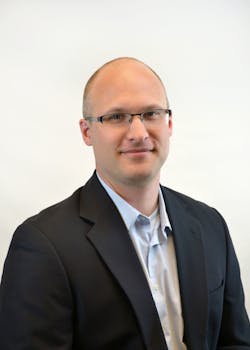Stefan Buck Appointed GM Of NSF International’s Global Drinking Water Treatment Programs
Source NSF International
ANN ARBOR, Mich., July 08, 2019 (GLOBE NEWSWIRE) -- Stefan Buck has been promoted to General Manager of NSF International’s Global Drinking Water Treatment Unit and Biosafety Cabinet Programs.
In his new role, Buck will be responsible for NSF International’s certification services for point-of-use (POU) and point-of-entry (POE) drinking water treatment systems and components as well as for NSF’s biosafety cabinet certification and field certifier accreditation program.
“We are thrilled to promote Stefan to GM for NSF’s drinking water treatment unit and biosafety cabinet programs. He has been an important member of our group’s success in recent years. We look forward to a seamless transition and continued growth of the program under his leadership,” says Dave Purkiss, NSF International’s Vice President for Water Systems.
Buck joined NSF in 2013 and was named Business Unit Manager for NSF’s Global Water Program – Filtration Division in 2014, where he directed day-to-day operations of NSF’s filtration certification program. In this role, he worked closely with drinking water filter manufacturers during the testing and certification process and helped identify emerging drinking water treatment issues and needs for new protocols and standards.
Buck was directly involved in NSF International’s public health communication efforts during the Flint water crisis, when NSF International, as third-party expert, helped local and federal regulators and news media understand the need for testing and certification of drinking water filters with lead reduction claims.
Before joining NSF International, Buck served more than 10 years in the environmental industry with special interest in hazardous waste risk assessment and energy efficiency of buildings.
He holds a bachelor’s degree in environmental studies from Lake Forest College and a master’s degree in environmental management from the University of Maryland.
NSF International facilitated the development of the American National Standards for point-of-use (such as faucet-mount and water pitcher filters) and point-of-entry (such as whole-house filter systems) water treatment products used by consumers to provide clean, safe drinking water for their families. These standards address the safety of materials that come in contact with drinking water, the structural integrity of the products and the contaminant reduction performance claims made by manufacturers. In addition to facilitating the development of new standards, and maintaining and updating existing standards through its Standards group, NSF’s program teams certify products to these standards and to those of other certification bodies.
NSF also certifies the design, construction and performance of biosafety cabinets and provides biosafety cabinet field certifier accreditation. NSF certification provides personnel, environmental and product protection for work involving procedures assigned to biosafety levels 1, 2, 3 and 4.To schedule an interview, contact Fran LeFort at [email protected] or +1.734.773.4253.
About NSF International
In 2019, NSF International is celebrating 75 years of protecting and improving human health. The global public health organization facilitates standards development, and tests and certifies products for the food, water, health sciences and consumer goods sectors to minimize adverse health effects and protect the environment. Founded in 1944, NSF is committed to protecting human health and safety worldwide. NSF International is a Pan American Health Organization/World Health Organization (WHO) Collaborating Center on Food Safety, Water Quality and Indoor Environment.NSF International’s global water programs provide risk assessments, testing, inspection and certification services for the water industry from source to tap. NSF led the development of the American National Standards for all materials and products that treat or come in contact with drinking water to help protect public health and the environment and minimize adverse health effects. In 1990, the U.S. EPA replaced its own drinking water product advisory program with these NSF standards.






